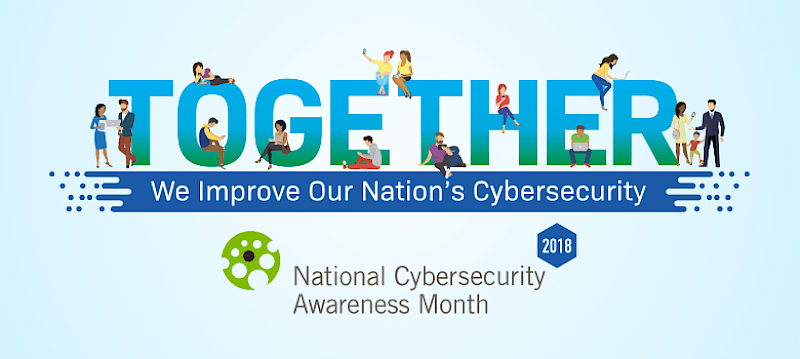
In the News
National Cybersecurity Awareness Month: Tips for Keeping Your Personal Data, Personal.
Halloween isn’t the only thing happening in October; it’s also National Cybersecurity Awareness Month (NCSAM). Launched in 2003, NCSAM is a month-long effort to educate the public about the importance of security awareness, and the genuine threats happening online.
Created by the U.S. Department of Homeland Security and the National Cybersecurity Alliance, NCSAM is essential, because there are a lot of digital risks out there.
With the continuing trend of Russian hackers, kids with laptops who are smart enough to hack Tesla, and attacks like those that leave Target scrambling, it’s good practice to be prepared, and know how to defend yourself.
In recognition of the month, we’ll be offering some cyber security awareness tips and tricks as to what you can do to check your systems or adjust your processes even if you’re not great with technology.
Cybersecurity is something we all can get behind because frankly, knowing there are people out there who can hack the little camera on your laptop is quite frightening.
To get started down our cybersecurity journey, here are a few things you can do right now to make yourself safer online:
Don’t be Facebook friends with that strange, attractive person…
Let’s just be realistic, if a beautiful woman or extremely attractive man with no mutual friends, who also happens to look like a model on some faraway beach wants to be your friend on Facebook, it’s likely a bot. A bot that wants to hack into your account with the goal of selling your friends knock off Ray Ban sunglasses. If you’re going to add people on social media at least have some tangible connection to them.
Ransomware is a Real Threat
Ransomware is a real (and really annoying) threat. Ransomware will break into your network through an innocuous back door and then once it has access to your information, lock you out until you agree to the ransom; which can cost you thousands of dollars with no guarantee of recovering your data.
To fight ransomware, we suggest:
- Keep your OS up-to-date – there are always patch fixes
- Never open .zip files from senders you don’t know
- Never click on random links or download files from strangers
Lock it all up
Put passwords on your devices. And not 000000, either. (Kanye, we’re looking at you.) If you leave your phone or laptop easily accessible on a table, who knows what valuable and personal information they can find.
Be a Little Paranoid
Use common sense when you’re online. Follow these three simple rules:
- If it seems too good to be true, it probably is
- If it looks like it’s probably a bad idea, it’s a bad idea
- If someone is asking for personal information, don’t give it to them
Get a VPN
A VPN (Virtual Private Network) is an encryption tunnel between you and your online behavior. A VPN hides your identity and location, and your information is encrypted.
Check for the https://
Websites with an SSL Certificate, if the website has a https:// URL, encrypts data coming and going to the site. Anything without the https:// risks the chance of getting compromised. Don’t give websites without an https:// any personal information including online shopping.
Be Mindful
If you’re working at a coffee shop or at a cafe, you’re on a public Wi-Fi network. Whatever you’re free to do, so is someone else. Don’t leave yourself open to hackers while shopping online using an unsecured Wi-Fi network (unless you’re using a VPN).
These are just a few of the tips and tricks we’ll be sharing throughout October. If you’ve got a tip, you’d like us to share, hit us up on Twitter or Facebook. For everything else, check the Golden Frog blog

